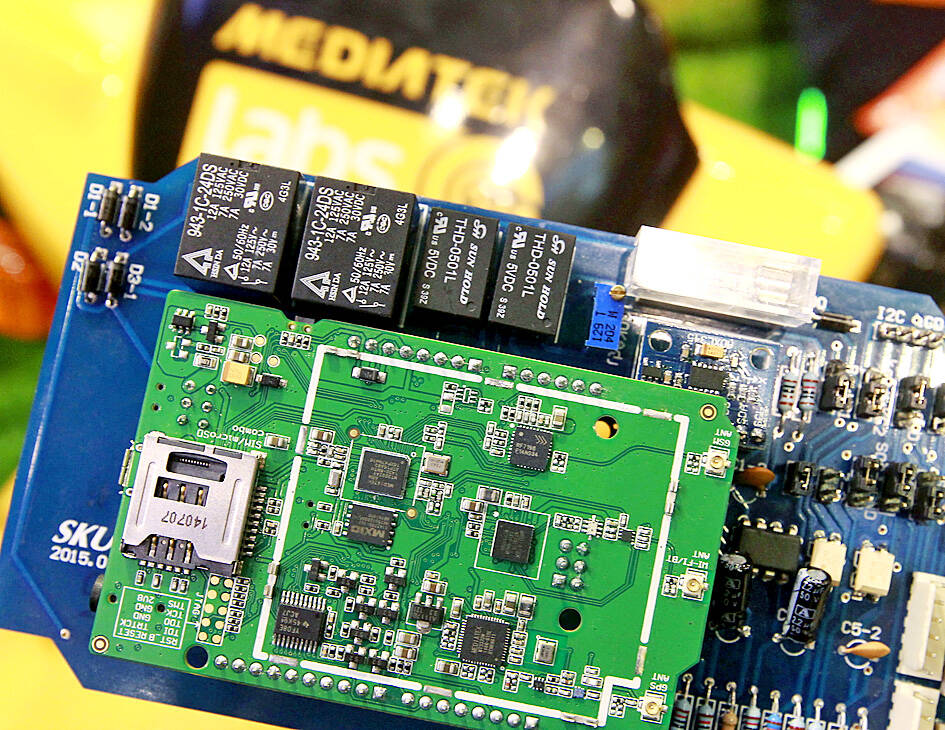The nation’s small and medium-sized IC design companies are to receive subsidies from the Ministry of Economic Affairs to develop chips more advanced than 28-nanometer nodes, the Central News Agency (CNA) reported on Sunday, citing sources from the Industrial Development Bureau.
As part of the government’s 10-year plan to develop Taiwan into a pivotal hub for IC design with a significant presence in the global market by 2033, the ministry plans to allocate NT$800 million (US$25.06 million) to subsidize local small and medium-sized IC design firms, the report said.
Companies might receive a maximum subsidy of 50 percent of what they request to focus on artificial intelligence, smart vehicle or other high-performance chips, it said.

Photo: Pichi Chuang,Reuters
In addition to well-known IC designers such as MediaTek Inc (聯發科), Realtek Semiconductor Corp (瑞昱) and Novatek Microelectronics Corp (聯詠), there are about 200 small and medium-sized IC design companies in Taiwan, according to the bureau.
Detailed application terms are still under discussion within government agencies, which are expected to be announced early next year, the report said.
The plan needs to be reviewed and approved by the Executive Yuan, and the ministry aims to launch it next year, it said.
The US last year imposed strict controls on exports of chips more advanced than 28 nanometers to China for 10 years, a move that experts said would lead China to focus on mature technologies like 28 and 40-nanometer nodes.
Taiwan’s small and medium-sized IC design companies are likely to face a price war from their Chinese peers, as local firms’ main business focus is 28-nanometer technology at present, with only a few having the capability to develop 16-nanometer chips, bureau officials said.
For many small and medium-sized IC design companies, developing advanced nodes such as 16 and 14 nanometers poses a considerable burden on their finance, costing more than NT$100 million and warranting subsidies from the government, bureau officials said.
In March, MediaTek chairman Tsai Ming-kai (蔡明介) said the government should pay more attention to IC design companies instead of semiconductor makers and called on policymakers to propose at least NT$10 billion to assist the local IC design industry given the rising competition from China.
The National Science and Technology Council last month unveiled a 10-year initiative aiming to increase local IC design companies’ global market share to 40 percent by 2033 and to achieve an 80 percent global market share for advanced semiconductors of 7 nanometers or below. The council is planning a budget of NT$12 billion for the initiative next year.

AT RISK: The council reiterated that people should seriously consider the necessity of visiting China, after Beijing passed 22 guidelines to punish ‘die-hard’ separatists The Mainland Affairs Council (MAC) has since Jan. 1 last year received 65 petitions regarding Taiwanese who were interrogated or detained in China, MAC Minister Chiu Chui-cheng (邱垂正) said yesterday. Fifty-two either went missing or had their personal freedoms restricted, with some put in criminal detention, while 13 were interrogated and temporarily detained, he said in a radio interview. On June 21 last year, China announced 22 guidelines to punish “die-hard Taiwanese independence separatists,” allowing Chinese courts to try people in absentia. The guidelines are uncivilized and inhumane, allowing Beijing to seize assets and issue the death penalty, with no regard for potential

STILL COMMITTED: The US opposes any forced change to the ‘status quo’ in the Strait, but also does not seek conflict, US Secretary of State Marco Rubio said US President Donald Trump’s administration released US$5.3 billion in previously frozen foreign aid, including US$870 million in security exemptions for programs in Taiwan, a list of exemptions reviewed by Reuters showed. Trump ordered a 90-day pause on foreign aid shortly after taking office on Jan. 20, halting funding for everything from programs that fight starvation and deadly diseases to providing shelters for millions of displaced people across the globe. US Secretary of State Marco Rubio, who has said that all foreign assistance must align with Trump’s “America First” priorities, issued waivers late last month on military aid to Israel and Egypt, the

‘UNITED FRONT’ FRONTS: Barring contact with Huaqiao and Jinan universities is needed to stop China targeting Taiwanese students, the education minister said Taiwan has blacklisted two Chinese universities from conducting academic exchange programs in the nation after reports that the institutes are arms of Beijing’s United Front Work Department, Minister of Education Cheng Ying-yao (鄭英耀) said in an exclusive interview with the Chinese-language Liberty Times (the Taipei Times’ sister paper) published yesterday. China’s Huaqiao University in Xiamen and Quanzhou, as well as Jinan University in Guangzhou, which have 600 and 1,500 Taiwanese on their rolls respectively, are under direct control of the Chinese government’s political warfare branch, Cheng said, citing reports by national security officials. A comprehensive ban on Taiwanese institutions collaborating or

France’s nuclear-powered aircraft carrier and accompanying warships were in the Philippines yesterday after holding combat drills with Philippine forces in the disputed South China Sea in a show of firepower that would likely antagonize China. The Charles de Gaulle on Friday docked at Subic Bay, a former US naval base northwest of Manila, for a break after more than two months of deployment in the Indo-Pacific region. The French carrier engaged with security allies for contingency readiness and to promote regional security, including with Philippine forces, navy ships and fighter jets. They held anti-submarine warfare drills and aerial combat training on Friday in